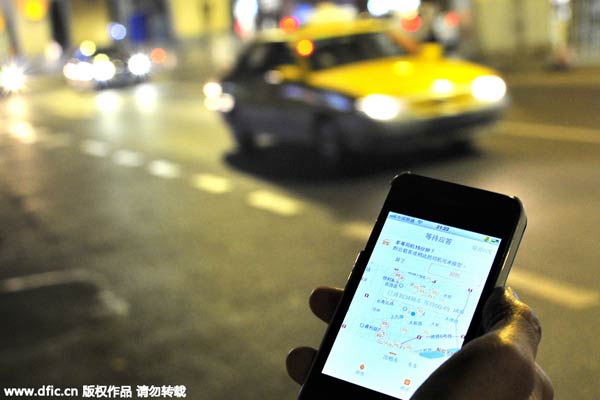The inexorable logic of sharing economy
Updated: 2015-10-09 07:23
By MICHAEL SPENCE(China Daily)
|
|||||||||
 |
|
A man uses taxi-hailing app on his smartphone on a road in Guangzhou city, South China's Guangdong province, April 9, 2015. [Photo/IC] |
Amazon and eBay, following their establishment in 1994 and 1995, harnessed the connectivity of the Internet to create new, more efficient markets. In the beginning, that meant new ways of buying and selling books and collectibles; but now e-commerce is everywhere, offering customers new goods and used goods-and becoming a global force in logistics and retail. Likewise, while today's sharing-economy companies may be just out of their infancy, their services will one day be ubiquitous.
By now, most people have heard of Airbnb, the online apartment-rental service. The company has just 600 employees but a million properties listed for rent, making it larger than the world's biggest hotel chains. Of course, what Airbnb offers is different from what hotels provide; but if Airbnb offered options for, say, maid service or food, they could become closer competitors than one might initially imagine.
The Internet enables creative new business models that increase not only a market's efficiency but also the utilization of our various assets. Hundreds of experiments are being conducted. Clearly, not all of them will experience the astonishing growth of Airbnb and Uber. Some, like Rent the Runway for designer clothes and accessories, may find profitable niches; others will simply fail.
The digital platforms that act as the basis of all this e-commerce need to meet two related challenges. The first is to produce a network effect, so that buyers and sellers find one another often enough and rapidly enough to make a business sustainable. Second, the platform must create trust-in the product or the service-on both sides of the transaction.
Trust is crucial to the network effect; hence the need for two-way evaluation systems that encourage buyers and sellers to be repeat users of the relevant platform. Small players can then act in large markets, because-over time-they become known quantities. The power of these platforms derives from overcoming informational asymmetries, by dramatically increasing the signal density of the market.
Indeed, in order to encourage infrequent e-commerce users, innovators and investors are exploring ways to combine the evaluation databases of separate, even rival, platforms. Whatever the legal and technical issues that must be overcome, down the road we can surely imagine the kind of data consolidation already practiced internally by retail giants like Amazon or Alibaba.
Some sharing models-perhaps most-rely on both labor and other assets: for example, a person and his or her car, computer, sewing machine, or kitchen (for home-delivered meals). This throwback to the cottage industries that preceded modern production is possible today because the Internet is lowering the costs of dispersion that once compelled the concentration of work in factories and offices.
Perhaps inevitably, regulatory issues arise, as Uber is now discovering from California to Europe. Taxis and limousines are to some extent protected from competition because they need licenses to operate; they are also regulated for customer safety. But then Uber invades their market with a differentiated product, subject largely to its own regulations for vehicles and drivers. In the process, it threatens to lower the value of licenses just as surely as any official decision to issue new licenses would. No wonder the taxi drivers of Paris and other French cities-hitherto protected from competition-have protested so vehemently (and, on occasion, violently).
An intriguing question is how far the financial sector will embrace the sharing economy. Peer-to-peer lending and crowd-funding already represent new ways of matching borrowers with investors. Clearly, issues relating to liability and insurance will have to be addressed in all sharing-economy models, especially financial ones; but these are hardly insurmountable obstacles.
The truth is that the Internet-led process of exploiting under-utilized resources-be they physical and financial capital or human capital and talent-is both unstoppable and accelerating. The long-term benefits consist not just in efficiency and productivity gains (large enough to show up in macro data), but also in much-needed new jobs requiring a broad range of skills. Indeed, those who fear the job-destroying and job-shifting power of automation should look upon the sharing economy and breathe a bit of a sigh of relief.
The author, a winner of Nobel Prize in economics, is professor of economics at New York University's Stern School of Business and senior fellow at the Hoover Institution.
Project Syndicate
Related Stories
Purecomm startup looks to transform China's Ecommerce 2015-09-18 21:11
Ecommerce brings new business, opportunities to China Commodities City 2014-05-07 07:13
Alibaba’s 6th ecommerce summit to mark company’s 10-year anniversary 2009-07-14 16:31
Airbnb sees China as next big pie 2015-09-13 14:01
Airbnb planning a deeper push in China 2015-08-20 11:11
Today's Top News
Inspectors to cover all of military
Britons embrace 'Super Thursday' elections
Campaign spreads Chinese cooking in the UK
Trump to aim all guns at Hillary Clinton
Labour set to take London after bitter campaign
Labour candidate favourite for London mayor
Fossil footprints bring dinosaurs to life
Buffett optimistic on China's economic transition
Hot Topics
Lunar probe , China growth forecasts, Emission rules get tougher, China seen through 'colored lens', International board,
Editor's Picks

|

|

|

|

|

|







